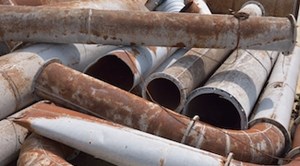EPA to accelerate nationwide lead pipe removal through new GLO initiative
(UI) –U.S. Environmental Protection Agency (EPA) Assistant Administrator for Water Radhika Fox announced the Get the Lead Out (GLO) Initiative that will help ensure safer drinking water for communities as part of President Biden’s Investing in America Agenda. Through the GLO initiative, which is funded entirely by the Bipartisan Infrastructure Law and is in partnership with the Department of Labor, EPA will partner with 200 underserved communities nationwide to provide the technical assistance they need to identify and remove lead service lines.
GLO will specifically help participating communities identify lead services lines, develop replacement plans, and apply for funding to get the lead out. Communities seeking to access GLO Initiative resources can request assistance by completing the WaterTA request form on EPA’s WaterTA website.
“An estimated 9.2 million pipes that provide drinking water to homes across the United States still contain lead, and they are most commonly found in older homes. This means they disproportionately impact families with the fewest resources to remove them. That’s why this new initiative is so critical – it will provide the kind of assistance that’s needed to accelerate the removal of lead where it’s needed most,” said EPA Assistant Administrator for Water Radhika Fox.
Signed in 2021, the Bipartisan Infrastructure Law provided a historic $50 billion investment in water and wastewater infrastructure, dedicating more than $15 billion to replacing lead service lines. EPA is committed to ensuring every community, particularly underserved and disadvantaged communities, can access their fair share of this unprecedented investment through a robust portfolio of Water Technical Assistance (WaterTA) programs, such as GLO.
Through GLO, EPA will develop tools and case studies to share information and best practices between the Agency, state and Tribal programs, water system managers, and community leaders.
Through its Lead Pipe and Paint Action Plan and Get the Lead Out Partnership, the Biden-Harris Administration has made accelerating the removal of lead service lines a top priority, with a goal of replacing 100% of lead service lines. EPA is committed to using every tool available including our statutory authority under the Safe Drinking Water Act, water technical assistance, infrastructure investments, and more to replace lead pipes and protect children and communities across America from lead in drinking water.
The GLO Initiative also builds on EPA’s “Lead Service Line Replacement Accelerators” initiative, which is in partnership with the Department of Labor, Connecticut, Pennsylvania, New Jersey, and Wisconsin. Through the Accelerators, EPA provides hands-on support to guide 40 communities in those states through the process of lead service line removals, from start to finish. This includes support in developing lead service line replacement plans, conducting inventories to identify lead pipes, increasing community outreach and education efforts, and supporting applications for Bipartisan Infrastructure Law funding. As a result, more communities will be able to access their fair share of federal funds to secure a lead-free future.
“Today, less than a year after piloting the Get the Lead Out Initiative, we celebrate another milestone on our way to meeting that historic goal – bringing five times as many communities nationwide into the fold for lead service line replacement,” said White House National Climate Advisor Ali Zaidi. “The ‘GLO’ initiative is a bright example of the President’s progress in delivering clean, safe drinking water to all communities through and with partners.”
Related News
From Archive

- Glenfarne Alaska LNG targets late-2026 construction start for 807-mile pipeline project
- U.S. water reuse boom to fuel $47 billion in infrastructure spending through 2035
- $2.3 billion approved to construct 236-mile Texas-to-Gulf gas pipeline
- Major water pipe break in Puerto Rico hits over 165,000 customers
- Potomac River Tunnel project enters construction phase beneath Washington, D.C.
- Pennsylvania American Water launches interactive map to identify, replace lead water service lines
- Trump's tariffs drive $33 million cost increase for Cincinnati sewer project
- Utah city launches historic $70 million tunnel project using box jacking under active rail line
- Tulsa residents warned after sewer lines damaged by boring work
- Fatal trench collapse halts sewer construction in Massachusetts; two workers hospitalized




Comments